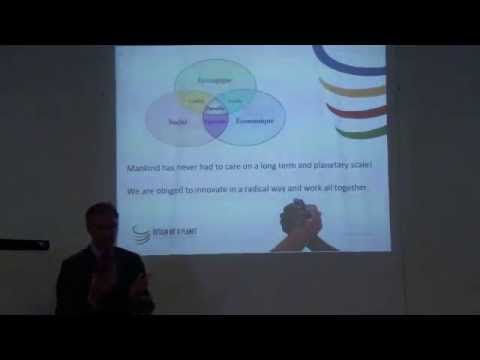PLANETARY AWARD
Once a year DESIGN ME A PLANET is giving away a price to reward peoples or institutions presenting outstanding initiatives in the field of innovation and in efforts of co-creation of possible and sustainable futurs for mankind.
This price rewards a local initiative, a national initiative and an international initiative.
The candidates are selected by an independant expert comitee.
The price reprensents a framed painting by Michel Saloff Coste showing a "planet".


Course of events of the PLANETARY AWARD:
2011: Dr. Peter Boehm, Siemens, received the price for the efforts of energy savings in home appliance
Mrs. Andrea Schlehuber, EZA (fair trade) for efforts and initiatives of respecting the producers and nature.
Mr. Dr. Ervin Laszlo for the whole body of his research.
2012: Mr. Michel Hasse, head of the Institut of the professions and training at Cofely-GDF Suez, Paris.
Mrs Barbara Marx Hubbard, Foundation of Conscious Evolution
Mme Reine Grâce, Singer
2013: Mr. Martin Hollinetz (OTELO) accepted the price on behalf of Mr. Bill Drayton – ASHOKA International
Mr.Franz Narradah accepted the price for Mr.Fritjof Bergmann
ARGE Sozial Villach received the local price.
2014: Mrs. Claudine Villemot-Kienzle accepted the price for
Mr. Dr. Don Beck, inventor of the Spiral dynamics.
Mr.Max Schachinger, Schachinger Logistik Hoersching
Starthilfe AP Villach received the local price.
2015: Professor Dr. Christof Mauch, founder and head of Rachel Carson Center Munich for Environment and Society -Ludwig- Maximilians Universitaet Munich received the price for the global work of the Institute
Doris Rasshofer, Chief Editor of the Magazine "Bestseller"
Elisabeth Steiner for her project "Fluechtlingsquartier Baerenwirt" inWeitensfeld received the local price.
2016; Dr.Linda Groff, Global Futurist & Synergist, Professor, Political Science & Future Studies,
received the International Planatary Award for her extensive studies in this field and books: "Future Human Evolution" and "Sustainable Peacebuilding" http://www.tagederzukunft.at/images/content/user/arnoldstein/Linda-Groff.pdf
Gary Martin received the International Planetary Award.
For the local initiative the Club Tre Popoli reveived the Planetary Award for enhancing efforts in understanding of people living in regional crossing of a slave, roman and german cultural environment.
2016; Dr.Linda Groff, Global Futurist & Synergist, Professor, Political Science & Future Studies,
received the International Planatary Award for her extensive studies in this field and books: "Future Human Evolution" and "Sustainable Peacebuilding" http://www.tagederzukunft.at/images/content/user/arnoldstein/Linda-Groff.pdf
Gary Martin received the International Planetary Award.
For the local initiative the Club Tre Popoli reveived the Planetary Award for enhancing efforts in understanding of people living in regional crossing of a slave, roman and german cultural environment.





 photos : 155
photos : 155

 photos : 553
photos : 553